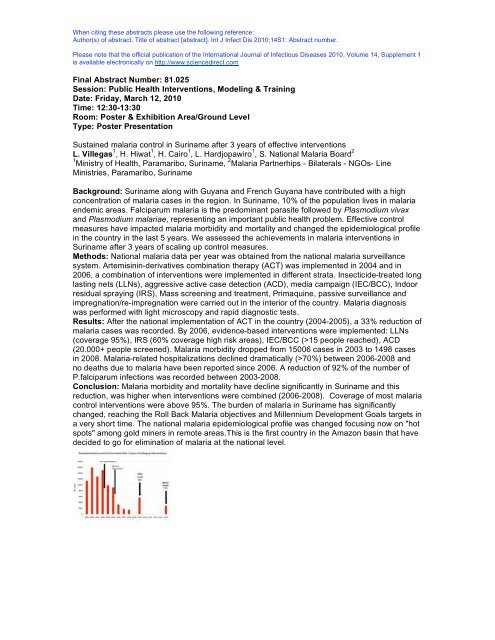14th ICID - Poster Abstracts - International Society for Infectious ...
14th ICID - Poster Abstracts - International Society for Infectious ...
14th ICID - Poster Abstracts - International Society for Infectious ...
Create successful ePaper yourself
Turn your PDF publications into a flip-book with our unique Google optimized e-Paper software.
When citing these abstracts please use the following reference:<br />
Author(s) of abstract. Title of abstract [abstract]. Int J Infect Dis 2010;14S1: Abstract number.<br />
Please note that the official publication of the <strong>International</strong> Journal of <strong>Infectious</strong> Diseases 2010, Volume 14, Supplement 1<br />
is available electronically on http://www.sciencedirect.com<br />
Final Abstract Number: 81.025<br />
Session: Public Health Interventions, Modeling & Training<br />
Date: Friday, March 12, 2010<br />
Time: 12:30-13:30<br />
Room: <strong>Poster</strong> & Exhibition Area/Ground Level<br />
Type: <strong>Poster</strong> Presentation<br />
Sustained malaria control in Suriname after 3 years of effective interventions<br />
L. Villegas 1 , H. Hiwat 1 , H. Cairo 1 , L. Hardjopawiro 1 , S. National Malaria Board 2<br />
1 Ministry of Health, Paramaribo, Suriname, 2 Malaria Partnerhips - Bilaterals - NGOs- Line<br />
Ministries, Paramaribo, Suriname<br />
Background: Suriname along with Guyana and French Guyana have contributed with a high<br />
concentration of malaria cases in the region. In Suriname, 10% of the population lives in malaria<br />
endemic areas. Falciparum malaria is the predominant parasite followed by Plasmodium vivax<br />
and Plasmodium malariae, representing an important public health problem. Effective control<br />
measures have impacted malaria morbidity and mortality and changed the epidemiological profile<br />
in the country in the last 5 years. We assessed the achievements in malaria interventions in<br />
Suriname after 3 years of scaling up control measures.<br />
Methods: National malaria data per year was obtained from the national malaria surveillance<br />
system. Artemisinin-derivatives combination therapy (ACT) was implemented in 2004 and in<br />
2006, a combination of interventions were implemented in different strata. Insecticide-treated long<br />
lasting nets (LLNs), aggressive active case detection (ACD), media campaign (IEC/BCC), Indoor<br />
residual spraying (IRS), Mass screening and treatment, Primaquine, passive surveillance and<br />
impregnation/re-impregnation were carried out in the interior of the country. Malaria diagnosis<br />
was per<strong>for</strong>med with light microscopy and rapid diagnostic tests.<br />
Results: After the national implementation of ACT in the country (2004-2005), a 33% reduction of<br />
malaria cases was recorded. By 2006, evidence-based interventions were implemented: LLNs<br />
(coverage 95%), IRS (60% coverage high risk areas), IEC/BCC (>15 people reached), ACD<br />
(20.000+ people screened). Malaria morbidity dropped from 15006 cases in 2003 to 1498 cases<br />
in 2008. Malaria-related hospitalizations declined dramatically (>70%) between 2006-2008 and<br />
no deaths due to malaria have been reported since 2006. A reduction of 92% of the number of<br />
P.falciparum infections was recorded between 2003-2008.<br />
Conclusion: Malaria morbidity and mortality have decline significantly in Suriname and this<br />
reduction, was higher when interventions were combined (2006-2008). Coverage of most malaria<br />
control interventions were above 95%. The burden of malaria in Suriname has significantly<br />
changed, reaching the Roll Back Malaria objectives and Millennium Development Goals targets in<br />
a very short time. The national malaria epidemiological profile was changed focusing now on "hot<br />
spots" among gold miners in remote areas.This is the first country in the Amazon basin that have<br />
decided to go <strong>for</strong> elimination of malaria at the national level.
















